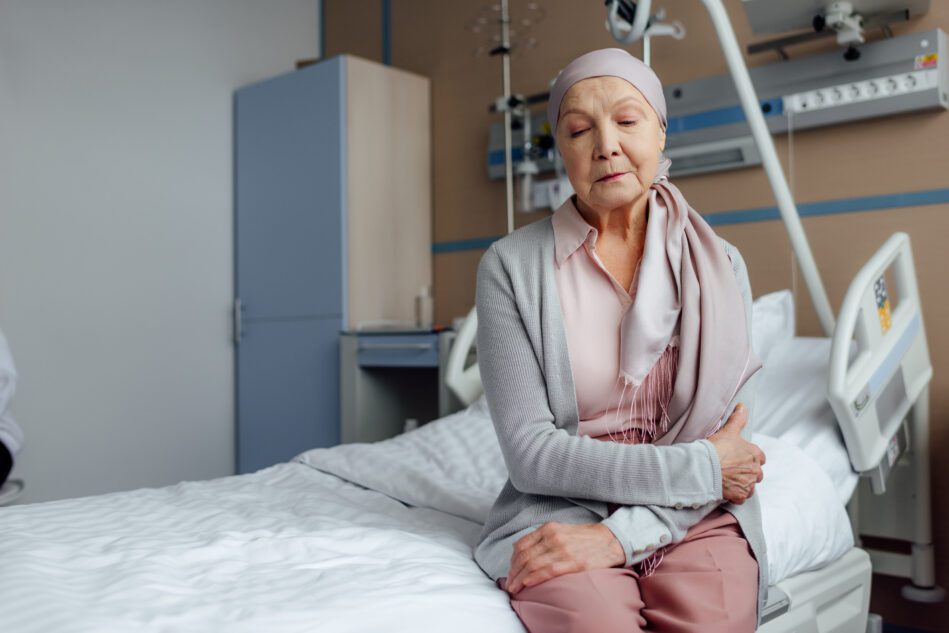The immediate side effects of chemotherapy, radiation and immunotherapy that treat cancer are well known to those directly affected by them. The reactions can include debilitating nausea, fatigue and dizziness as well as hair loss. What you may not know is that certain adverse effects of these life-saving medicines can last a lifetime.
Over the last several decades, cancer treatment has improved dramatically. Since the 1980s, survival rates have grown for all cancers. However, as people live longer, researchers have found more signs that the treatments that kill cancer cells can also attack healthy cells as well as organs, leading to lung damage, heart failure, secondary cancers and more.
“A cancer diagnosis introduces you to a new normal — one in which side-effect management becomes a permanent fixture. Sometimes, even the slightest ache or pain can send you spiraling,” Hil Moss, a breast cancer survivor and MBA and MPH candidate at Yale University, writes in STAT.
The type of cancer, treatment and dosages all play a role in the severity of your potential long-term side effects of chemo or radiation. As researchers have learned more about these effects, treatment strategies have improved and care teams are more vigilant in identifying possible damage before it becomes permanent.
“The majority of chemotherapies don’t have long-term effects” says Craig Cole, MD, a hematologist and oncologist at Michigan State University. “Over the past five years, that’s diminished, but there are specific chemotherapy and radiation therapies that can, and do, have long-term side effects.”
Chemotherapy, Radiation and Immunotherapy
Aside from the surgical removal of a malignant tumor, the three most commonly used strategies of treating cancer today are chemotherapy, radiation and immunotherapy, used alone or in combination.
Cancer cells grow much more quickly than normal cells; chemo drugs use that trait and target fast-growing cells. The loss of healthy fast-growing cells is the cause of many of chemo’s side effects and can weaken your immune system, leaving you vulnerable to infections and disease. Hundreds of different chemo combinations have been developed over the past two decades, each with their own benefits and side effects profile. If one chemo drug is ineffective or causes harmful or intolerable side effects, doctors have many other combinations to try.
Radiation is the use of energy materials to damage cancer cells. The energy can be delivered by a machine that sends beams of high-energy particles toward the cancer cells. This treatment is localized, so side effects are most likely to be related to where you received the radiation. For example, head, neck or thyroid radiation may leave a person unable to eat, swallow or talk. Alternatively, doctors can prescribe medicines, either solid or liquid, that deliver the source of radiation directly inside your body. In some cases, the treatment is still localized and a small solid will release radiation close to your tumor. In other cases, your treatment may be systemic, working to kill cancer cells throughout your body.
Immunotherapy is a type of treatment that helps your own immune system fight cancer. Normally, your immune system would attack dangerous cancer cells, but many tumors develop ways to trick your immune system into leaving them alone. The goal of immunotherapy is to strengthen your immune response and direct it toward the cancer. However, side effects can happen when your immune system simultaneously attacks healthy cells.
The risks of each of the three treatments or combination of treatments often overlap. That can also compound other health problems. It’s crucial that your physicians review with you the most serious potential side effects and which symptoms you should monitor closely. If the treatment does cause heart or lung damage, for example, your medical team can develop a safer plan for you.
Secondary Cancer
In 2006, the National Cancer Institute published data showing that patients who survived a cancer once were at a 14% higher risk than the rest of the population for developing a second primary cancer – a new cancer, separate from the first. The cause of the secondary cancer could be genetic predisposition, lifestyle factors, like smoking and limited physical activity, or damage done by previous cancer treatment.
A study published in JAMA Network in December 2020 suggests that the risk of second primary cancers among survivors is increasing. It also notes that these patients have a higher risk than those who haven’t had cancer of dying from the disease the second time they contract it.
What to do:
Commentary published alongside the study suggests that many cancers on the list were also associated with risk factors like smoking and obesity, suggesting that you might be able to mitigate your risk by maintaining a healthy lifestyle after treatment of your primary cancer. However, the authors also note that there are ways to manage the risks during the first treatment as well. They are: using the lowest possible dose of treatment, factoring in genetics to identify patients who are unlikely to benefit from adjuvant chemotherapy (chemotherapy given with another treatment to enhance benefits) and improving treatment protocols. One example, was that patients can be placed in the prone position (lying on their stomachs), which can decrease the risk of secondary lung cancer, while receiving radiation for breast cancer.
Heart Damage
Patients treated for cancers near the heart, like Hodgkin’s lymphoma or breast cancer, are at risk of arrhythmia (irregular heartbeat,) coronary artery disease and congestive heart failure. “It’s something that we carefully monitor for,” says Cole. “We get echocardiograms (EKGs) before we start therapy and afterwards to assure that their heart function is okay.”
Some chemo drugs, including their brand names in parentheses, that may cause heart damage are:
- trastuzumab (Herceptin, Ogivri)
- doxorubicin (Adriamycin, Coxil)
- daunorubicin (Cerbuidine)
- epirubicin (Ellence)
- cyclophosphamide (Genoxal, Mitoxan)
- osimertinib (Tagrisso)
What to do:
Your doctors should regularly screen your heart with an EKG before and after treatment. You yourself should also be alert to heart disease symptoms, such as shortness of breath, dizziness and swollen hands and feet. If you notice something amiss, immediately report it to your healthcare providers.
If you have already experienced heart problems as a result of chemotherapy or radiation, then eating a low-sodium diet can help. Click here to get advice about avoiding salt when dining in restaurants, written by Cindy Tenner, who began living with congestive heart disease several decades ago after receiving radiation for Hodgkin’s lymphoma. “All of my long-term health issues are from radiation,” she says, but she’s still grateful to have received the lifesaving treatment.
“One thing that has come out dozens of times across studies is the value of just regular exercise . . . You don’t have to run a marathon,” says Cole. “The cumulative toxicity of a lot of these drugs is amplified by a sedentary lifestyle. When people have [cancer] therapy, they don’t feel so good. But when they do feel better, they should be up and about and walking, because that helps [improve] cardiovascular and pulmonary health and lessens neuropathy [potentially painful nerve damage] — the whole nine yards.”
Paying Attention to Lungs
Like heart problems, lung damage can be a result of chemotherapy or radiation to the chest area. Symptoms include dry coughing and shortness of breath. Your risk may be higher if you already have a lung disease, like chronic obstructive pulmonary disease (COPD), or if you received both chemotherapy and radiation. Adds Cole, “If there’s any hint of there being any lung problems or heart problems, [then] we discontinue that drug and move on to a different therapy.”
Some chemo drugs, including their brand names in parentheses, that may cause lung damage are:
- bleomycin (Blexane)
- carmustine (Becenum, BiCNU, Carmubris)
- methotrexate (Rasuvo, Otrexup PF, Xatmep)
What to do:
Your doctor should regularly test your lung function. If your treatment has the potential to damage those organs, Cole recommends also making sure you’re aware of your exercise tolerance. How far or fast can you walk before you’re out of breath? If you monitor that exercise, you’ll notice quickly if something changes and can alert your care team. “A lot of these things with the heart [and] the lungs are reversible if the drug is discontinued,” adds Cole. “ [The condition] can end up being irreversible if the drug is continued, without either the patient relating it or the provider picking up on it.”
Neuropathy
After four months of chemotherapy along with a double mastectomy to treat two highly aggressive breast tumors, Cynthia Bailey, MD, remarks “I like to say that I’m alive to complain about my side effects.”
In the seven years since Bailey’s treatment, she has had to manage peripheral neuropathy damage to the nerves that can cause symptoms like tingling, numbness and pain. It can also lead to muscle atrophy and weakness. She says she has had to be understanding with herself, and make adjustments like not walking in the dark because she struggles to maintain balance.
“Neuropathy, sometimes, can be further down on the list of potential toxicities” in drug information, says Cole, “but actually it can be severe.” He adds that both older chemotherapies and even newer immunotherapies can cause severe neuropathy if patients aren’t monitored carefully. In addition to pain and tingling, damage to the nerves can cause loss of balance and difficulty performing daily living activities like walking, feeding yourself or buttoning your shirt. It can also cause constipation and stomach pain. If it’s very acute, it can even damage organs.
Some chemo drugs, including their brand names in parentheses, that may cause neuropathy are:
- paclitaxel protein-bound, paclitaxel albumin-bound (Abraxane)
- carboplatin (Paraplatin)
- eribulin (Halaven)
- vinorelbine (Navelbine)
- paclitaxel (Taxol, Onxal)
- docetaxel (Taxotere)
- vincristine, leurocristine (Oncovin)
What to do:
Activities like swimming and biking can help prevent and manage neuropathy symptoms, as can physical therapy.
If you experience symptoms of neuropathy, be sure to report them to your doctor right away. Depending on the neuropathy’s and your cancer’s seriousness, your team may choose to lower or delay the dose or switch to a different medicine. Otherwise, they may prescribe drugs like steroids to reduce inflammation or topical medications that can help alleviate pain.
Other Organ Cancer Damage
Your liver and kidneys can take a beating from chemotherapy drugs as well. Changes in urination, like a darker color, or less frequency or feeling a burning sensation when you pee can signal damage to either of these organs. Other signs of liver damage include yellowing of the eyes and skin, pain — especially in your abdomen — and flulike symptoms.
Some chemo drugs, their brand names in parentheses, that may hurt organs are:
- tamoxifen (Nolvadex, Soltamox)
- ado-trastuzumab emtansine (Kadcyla)
- ribociclib, LEE011 (Kisqali)
- neratinib (Nerlynx)
- abemaciclib (Verzenio, Verzenios, Ramiven)
- atezolizumab (Tecentriq)
What to do:
Your doctor may order blood samples and other tests to assess your liver function throughout treatment to monitor for signs of damage. Some drugs, like Tylenol or generic acetaminophen and supplements can increase harm to the organs. Make sure you talk to your care team about any drugs and supplements you take, even if they are over-the-counter.
“Chemo Brain”
“Chemo brain” is a term often used to describe the effects of cancer treatment on cognition, but the experience isn’t unique to chemotherapy. Patients who undergo radiation and immunotherapy sometimes report long-term side effects including difficulties with learning, memory or attention span.
What to do:
It’s often unclear whether chemo brain is caused by cancer or its treatment, and there aren’t any drugs approved to treat it. However, your healthcare provider may suggest blood tests to check for known causes of brain fog like anemia. They may also offer drugs to treat insomnia or attention deficit hyperactivity disorder (ADHD). Lastly, they may recommend meditation, relaxation or even exercising your brain with word puzzles to help recover your abilities.
Hormonal Disturbances
Cancer treatments can cause hormonal disruptions and infertility in both men and women. Surgery to remove a woman’s ovaries or radiation to her pelvic area may lead to symptoms of menopause. Men may experience similar symptoms if they have hormone therapy or surgery to remove their testicles. Radiation to the head or neck in both women and men can also cause hormone disruptions by damaging the thyroid gland.
Talking to Your Doctor
Cancer treatment can cause a variety of other long-term symptoms, including osteoporosis, pain, sexual dysfunction and problems with learning and memory. It’s crucial to understand the risks of your specific treatment plan. That way, you know which signs to watch out for during treatment so that you can reduce the chances of any permanent damage.
Before you see a physician, Cole recommends writing down your questions and taking them with you to the appointment. They might include:
- What long-term side effects does my cancer treatment plan cause?
- What early-warning signs and symptoms should I look out for?
- How can I minimize the risks?
- Where can I find more information?
You should also write down the answers your doctor gives you or record the conversation for future reference. Doctors can use terms unfamiliar to a layperson like you. Be sure to ask her or him to explain them in plain language.
He also recommends getting a second opinion. This is wise because it can be helpful to hear your treatment plan explained by another professional and to have extra opportunities to ask questions, not because another doctor will necessarily disagree with your care team’s plan.
Lastly, patient support groups can be beneficial. “It’s really helpful to talk to a patient that has gone through it, that has the same type of cancer a patient has,’” says Cole, adding that “usually the social worker at a cancer center can hook you up with another patient who’s been through it.”
Additionally, most cancer foundations, like the Leukemia & Lymphoma Society or the Multiple Myeloma Research Foundation, can direct you to communities of patients who have cancers like yours and have undergone similar treatments. Tenner also recommends using social media to connect with other survivors. She belongs to several Facebook groups: one centered on congestive heart failure, two groups that focus on how to live on a low-salt diet and another that’s a Hodgkin’s survivor group.
The National Cancer Care Network offers comprehensive guidelines for cancer survivors about managing the long-term effects of treatment and the increased risk of a secondary cancer.






